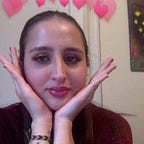“Not living up to her potential”- A Formerly Gifted Child Reflects on Growing Up Neurodivergent
Every. single. report. card. “Disorganized.” “Does not complete assignments on time.” “Does not come prepared to class.”
I might have won the record for the most amount of times “Not living up to her potential” was the feedback from my teachers at the end of every academic quarter. This narrative is something that was repeatedly hammered into my young, vulnerable, developing mind, and of course, my family was both concerned and disappointed. How could I, a child who was supposedly so “gifted,” be struggling so much to complete basic tasks?
Sitting at the table after school and opening my backpack to complete homework (which I may or may not have remembered to even bring home with me) was absolutely inconceivable to me. Despite the best intentions, I simply just couldn’t do it. What was wrong with me? Why couldn’t I just be on top of things like everyone else?
Now, I have those answers — my nervous system was completely, and totally, overloaded to the point of utter unmanageability. I didn’t have the awareness that the school environment made my sensory system go absolutely haywire, and my social battery was burnt out from constantly masking to the point where my biggest task was simply surviving the day. Every day. With no reprieve.
I feel sad thinking about the chronic stress that I was under. If only I had someone who saw what was happening inside, instead of placing blame on me that I carried for years. A blame that manifested in some extremely detrimental ways including isolation, self-medicating with substances, and self-harm.
Looking back, I wish I could share this information with my younger self. You’re not broken, Dani, you are neurodivergent. Your brain works differently. You need different things. You process things differently. You have unique needs. And that’s okay.
I was diagnosed with ADHD at age 13, and prescribed every stimulant under the sun. I was not compliant with my medications, because I didn’t trust that some psychiatrist who met me for 15 minutes every few months truly understood what was happening in my inner world and certainly did not care about me. It felt impersonal. It felt like someone throwing prescriptions at me to fix me. I wasn’t told that I could be successful or that I can learn to accommodate my unique needs or that the SYSTEM could be more inclusive to me, rather than trying to make me conform to norms that weren’t designed for me. I regressed into my little shell because I told myself that no one understands. Which was largely true. Instead, I was told by the same 15-minute psychiatrist in some fancy waterfront medical office who drove a Porsche, that I had Oppositional Defiant Disorder. That surely did wonders for my self-esteem… (sarcasm.)
I vowed to become a mental health professional so I could be the change that I wished to see. It was only after entering the field of working with others with developmental, intellectual, and learning disabilities, I felt seen for the first time. It was through working with autistic clients that I realized that I am autistic. Lightbulb moment for me honestly, as my entire childhood flashed before my eyes. The social demands that were driving me to some extremely dark places, the bullying, the labels, the struggles, the meltdowns, the self-sabotage and self-injury, the negative feedback from teachers, the refusal to conform to neurotypical expectations — it all made sense. By accepting neurodivergence as part of my identity, that shame and blame no longer had power over me. In fact, I blame the dozens of institutions and providers and school administrators and counselors who destroyed my self-esteem. The system absolutely harmed me and made me believe things about myself that I thought I could never overcome.
I am now a licensed clinical social worker providing therapy and coaching to neurodivergent adults where I celebrate and support who they are. I help them identify what their strengths and differences are, and allow them to develop their own appreciation for themselves after a lifetime of “professionals” telling them that their way of being is wrong. It is such a fundamental transformation when neurodivergent people are given the space to meet themselves where they are at.
To this day, I will never tell someone “you have so much potential.” It can be ableist and not helpful the way you might think. I refuse to project my own ideas about what I think someone is capable of. I ask them who they are, what they need, and what matters to them. I wish I was asked those questions. My concern is helping people live a life that is meaningful for them, with unconditional support. If you forget to bring a pencil, here’s one of mine. Let’s do this together. You’re not alone, and you are not expected to be perfect.
Thanks for reading as I share my passions of both writing and disability advocacy. If you would like to connect with me, please reach out at dani@neurosparkhealth.com, or visit www.neurosparkhealth.com to schedule a free consultation with me to explore how I could support you through neurodiversity-affirming coaching. I ❤ this community.
